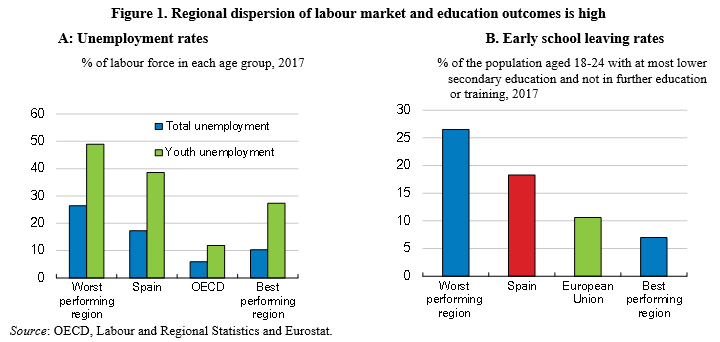Reducing regional disparities for inclusive growth
By Müge Adalet McGowan, Spain desk, OECD Economics Department
 Ensuring the benefits of growth are spread widely requires a strong focus on greater convergence of regions in terms of income and well-being. The GDP per capita in the best performing region was around double that in the worst performing region in 2016. Income inequality and poverty rates are also high, with regional differences.
Ensuring the benefits of growth are spread widely requires a strong focus on greater convergence of regions in terms of income and well-being. The GDP per capita in the best performing region was around double that in the worst performing region in 2016. Income inequality and poverty rates are also high, with regional differences.
High regional dispersion in education and job outcomes, compounded by low inter-regional mobility, emerge as key drivers of regional inequalities in income and well-being (Figure 1). At the same time, productivity growth has stagnated in Spain (Figure 2). Barriers to achieving a truly single market limit productivity growth of regions, including the most advanced. Hence, the 2018 OECD Economic Survey of Spain highlights that a dual approach of enhancing both the productive and employment capacities of lagging regions is needed (OECD, 2018). Reducing regional disparities will also depend on effective coordination and sharing of best practices across regions.

Stronger coordination between employment and social services is key to providing effective transitions between social support schemes and employment, given the multiple barriers that the unemployed might face (Fernandez et al., 2018). Improving coordination to provide integrated support for jobseekers via a single point of contact for social and employment services and assistance would improve the effectiveness of such policies.
Lack of full portability of social and housing rights across regions, due to prior residency requirements, contributes to low labour mobility. The 2018 OECD Economic Survey of Spain recommends ensuring full portability of these benefits across regions, by providing temporary assistance either by the region of origin or the central government.
Increasing the quality of education would improve the employability of the labour force in lagging regions and should be complemented with policies to raise job quality in regions with low-skilled jobs. For example, providing individualised support to students at the risk of failing at an early stage has contributed to lower early school leaving rates in some regions. Increasing the adaptability of workers, via lifelong learning policies better targeting the participation of low-qualified adults, would improve the matching of skills to labour market needs.
Reducing regional regulatory differences is key to achieving a truly single market and firm growth. The 2018 OECD Economic Survey of Spain recommends strengthening the implementation of Market Unity Law through enhanced cooperation and coordination across different levels of government and the assessment of the compliance of new legislation at all levels of government with the principles of the Market Unity Law. Removing the remaining barriers in some professional services would also improve competition and boost productivity.
References:
OECD (2018), OECD Economic Surveys: Spain 2018, OECD Publishing, Paris. https://doi.org/10.1787/eco_surveys-esp-2018-en.
Fernandez, R., et al. (2018), “Faces of Joblessness in Spain: A People-centred perspective on employment barriers and policies”, OECD Social, Employment and Migration Working Papers, No. 207, OECD Publishing, Paris, https://doi.org/10.1787/6149118d-en.